|
On 15 July, Ambassador Liu Xiaoming held a webinar with Official Monetary and Financial Institutions Forum (OMFIF) and Centre for European Reform (CER) on China-Europe relations after the pandemic, where he delivered a keynote speech entitled Join Hands to Contribute Positive Energy and Create a Better Future for China-Europe Relationship. Around 100 people joined the event, including David Marsh, Chairman of OMFIF, Meghnad Desai, Chairman of OMFIF Advisory Board, Charles Grant, Director of CER, Sir Sherard Cowper-Coles, Chairman of China-Britain Business Council, members from the two think tanks, representatives from economic, financial and academic sectors in the UK, Europe, North America, Australia and South America, and journalists from 14 media agencies took part in the conference, including the BBC, Sky News, Reuters, The Daily Telegraph, Financial Times, The Guardian, The Independent, CGTN, The Associated Press, Bloomberg, NBC, Agence France-Presse and bTV. The BBC and Sky News broadcast Ambassador Liu's keynote speech and part of the Q&A session live and run the coverage in their prime time programs. The transcript of the webinar is as follows:
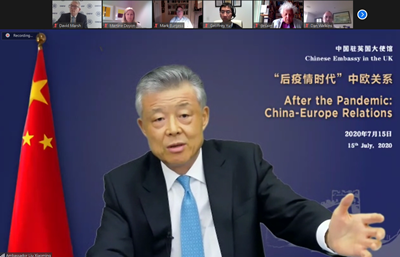
Ambassador Liu: Chairman Marsh, Director Grant, Ladies and Gentlemen:
Good morning!
It is a real delight to join you on-line to talk about China-Europe relations after the pandemic.
This year marks the 45th anniversary of China-EU diplomatic relations. In the past 45 years, China's relationship with Europe has become increasingly comprehensive, mature and steady. This relationship has delivered tangible benefits to the people of both sides and contributed positive energy to world peace and prosperity.
Last month, the 22nd China-EU Summit was held on-line. President Xi Jinping had a meeting with President of the European Council Charles Michel and President of the European Commission Ursula von der Leyen, and Premier Li Keqiang co-chaired the summit with the two presidents. These meetings charted the course for the relationship between China and Europe after the pandemic.
As Covid-19 continues ravaging the world, the international landscape and the global governance system face profound changes. This most serious pandemic in a century has revealed four global deficits.
First, the health deficit.
Covid-19 has spread to more than 210 countries and regions, affecting more than 7 billion people, infecting over 13 million people and claiming over 560,000 lives. It is the gravest global public health emergency after the Second World War. It poses severe challenge to the safety and health of mankind, and requires the joint response of the international community, including China and Europe.
Second, the development deficit.
This pandemic has resulted in a severe recession in the world economy. According to OECD forecast, European economy would be the hardest hit this year.
International travel and trade are disrupted by restrictions and the global industrial chain is under severe strain. The IMF and the World Bank predicted respectively 4.9% and 5.2% contraction in the world economy this year. How to achieve economic recovery and continued growth is a daunting task for all countries.
Third, the peace deficit.
The pandemic has aggravated the severe challenges from incessant regional conflicts and wars, raging terrorism, and grave humanitarian crisis. People in many countries, especially children, are still suffering. World peace, security and stability are under grave threat.
Fourth, the governance deficit.
The pandemic has revealed the weak links in the global public health governance system which is in need of urgent improvement. Surging protectionism, unilateralism and anti-globalisation, and politically motivated labeling attempts are eroding international solidarity and undercutting joint response to the pandemic. They also pose grave challenges to the global governance system and multilateral mechanisms.
Covid-19 reminds the world that mankind belongs to a community with a shared future. Scapegoating and shirking responsibilities are unhelpful to solving problem or saving lives. Solidarity and cooperation are the only right way forward in this fight against the virus.
Both China and Europe are major global players, big markets and great civilisations. It is important that the two sides join hands to contribute
-
to the global response to Covid-19,
-
to world economic recovery,
-
to improving global governance,
-
and to overturning the deficits.
First, China and Europe should work together to safeguard the health and safety of mankind.
China attaches great importance to cooperation with the international community, including Europe, on fighting the pandemic.
At the 73rd World Health Assembly last May, President Xi Jinping called for the building of a global community of health for all. He also announced that in the coming two years, China will provide 2 billion US dollars in international aid; when China is successful in developing a vaccine and put it to use, China will make it a global public good.
China also took an active part in the Coronavirus Global Reponse Pledging Conference initiated by the EU and the Global Vaccine Summit hosted by the UK.
Going forward, China and the EU should
-
continue sharing experience in epidemic-containment,
-
enhance cooperation on R&D of vaccine and medicines,
-
strengthen support to regions with weak public health systems,
-
and actively explore tri-party cooperation between China, the EU and Africa on epidemic response.
Together China and the EU could help strengthen global defense against threats to public health, and contribute to building a global community of health for all.
Second, China and Europe should work together to uphold world peace and stability.
China and the EU have, between them, one tenths of the world's land area, one fourth of the world's population and two permanent members of the UN Security Council. There is every reason that China and the EU should play a key role in safeguarding world peace and stability.
China and Europe should enhance strategic dialogue to step up coordination and communication on major international and regional issues. This include:
-
supporting the settlement of all hotspot issues and regional conflicts through peaceful dialogue and consultation;
-
upholding the global non-proliferation regime so as to safeguard global strategic stability.
-
supporting measures aimed at striking down upon terrorism of all forms and addressing both symptoms and root causes of terrorism, with a view to containing the spread of extremist ideas.
Third, China and Europe should work together to promote development and prosperity in the world.
In face of the challenges from Covid-19, it is all the more important to stay committed to open cooperation.
China and the EU as two major economies should be the "dual engines" of the world economy that
-
drive economic recovery,
-
bring economic activities back on track in an orderly manner,
-
and safeguard the open, stable and secure global industrial and supply chains.
To achieve these goals, China and the EU should enhance coordination on macro-economic policies and uphold an open world economy.
In the first half of this year, the China Railway Express offered an important passage for unimpeded trade between China and Europe, with 5,122 trains shuttling between China and Europe, increasing by 36% year-on-year.
New areas such as connectivity, green development, ecological conservation, environmental protection, digital economy and artificial intelligence will create fresh opportunities for the mutually-beneficial cooperation between China and Europe.
The two sides should stay open to each other and strive to complete negotiations on the China-EU Investment Agreement with a view to reaching a comprehensive, balanced and high-standard agreement.
Fourth, China and Europe should work together to improve the global governance system.
China and the EU are both committed to multilateralism.
-
Both support greater democracy in international relations.
-
Both safeguard the international system with the UN at its core, the international order based on international law, and the multilateral trade system with the WTO as its cornerstone.
-
Both support the WHO in playing a leadership role in global response to Covid-19.
The two sides share common interests in
-
safeguarding global public health,
-
tackling climate change,
-
developing clean energy, clean transport and green technology,
-
and preserving bio-diversity.
The two sides have broad consensus on advancing reforms in the WTO and upholding free trade.
In this year that marks the 75th anniversary of the founding of the United Nations, China and Europe should work together to enhance communication and coordination, safeguard multilateralism and improve global governance.
Ladies and Gentlemen:
In the 45 years of China-EU diplomatic relations, win-win cooperation has been the main theme. In face of the new challenges brought by the pandemic, this relationship has some new problems to solve.
By this I mean the misgivings and doubts of some politicians in Europe who
-
see China as a "systemic rival",
-
regard China as a "potentially hostile state",
-
and believe there will be no going back to "business as usual" with China.
So now, China and Europe have the same questions before them.
In my opinion, China and Europe should pull together in the following four aspects:
First, respect each other and reject interference in other countries' internal affairs.
Mutual respect for sovereignty and territorial integrity, non-interference in other countries' internal affairs, equality and mutual benefit are the basic principles enshrined in the UN Charter and the basic norms governing international relations.
Experience of the past 45 years since China and the EU established diplomatic relations has told us that when these principles were upheld, China-Europe relationship would make progress; otherwise, this relationship would suffer setbacks or even retrogression.
China has never interfered in other countries' internal affairs, and we strongly oppose interference in China's internal affairs by other countries.
Last month, the Standing Committee of China's National People's Congress adopted the National Security Law for Hong Kong SAR to deal with the enormous risk Hong Kong faces in safeguarding national security.
This Law is aimed at preventing, suppressing and punishing four types of criminal activities. They are: secession, subversion, terrorist activities and collusion with a foreign country or with external elements to endanger national security.
-
The Law plugs the legal loophole in terms of national security in Hong Kong.
-
It targets a very few actions and activities that gravely jeopardize national security.
-
It will not affect the high degree of autonomy of Hong Kong.
-
It will not change Hong Kong's independent judicial power, including the power of final adjudication.
-
It will provide better safeguards for the rights and freedoms of the Hong Kong residents.
-
And it will ensure better protection of the legitimate rights and interests of foreign investors in the city.
It is not surprising that the National Security Law for Hong Kong SAR has been warmly welcomed by the Hong Kong residents. Nearly three million Hong Kong citizens have signed the petition in support of the Law. More than 70 countries in the world, including some European countries, have voiced their support.
However, some European politicians have made irresponsible remarks regarding this Law to interfere in Hong Kong affairs, which are internal affairs of China.
I want to emphasize that Hong Kong is part of China; Hong Kong affairs are China's internal affairs and brook no external interference.
It is my hope that the EU side will
-
view the National Security Law for Hong Kong SAR from an objective, reasonable and fair perspective,
-
take concrete steps to observe international law and basic norms governing international relations,
-
and stop interfering in Hong Kong affairs, which are internal affairs of China.
Second, China and Europe should see each other as partners and abandon the "Cold War" mentality.
China and the EU have established a comprehensive strategic partnership. The two sides are building a partnership for peace, growth, reform and civilization.
China will always pursue peaceful development. It is committed to peaceful co-existence, mutually-beneficial cooperation and common development with all countries, including European countries. It has always seen Europe as an equal partner rather than a rival.
Between China and Europe, there is no geopolitical discord or conflict in fundamental interests; there is more cooperation than rivalry, more consensus than differences.
Those who see China as a "systemic rival" or a "potentially hostile state" have got it all wrong: they have chosen the wrong target and they are heading in the wrong direction.
What China cares most is to improve the wellbeing of the Chinese people. China's priority is to realize national rejuvenation. And for this purpose, China aspires for a peaceful and stable world.
China and Europe should
-
deepen mutual trust through equal-footed dialogue,
-
achieve win-win results through cooperation,
-
and deal with differences appropriately through constructive communication.
It is important that China and Europe facilitate each other's success in a positive cycle, rather than engaging in a knockout match where one side's gain is built on the other's loss.
Third, China and Europe should seize the opportunities of each other's development and reject zero-sum game.
China's development creates opportunities rather than challenges, still less threats, to Europe.
China and the EU, as two major markets of the world, account for one third of the world's total economy. The two sides are each other's second largest trading partner. And the two economies are highly complementary.
During the outbreak of Covid-19, enormous vitality and growth potential are seen in "stay-home economy", "cloud office", intelligent manufacturing, life and health industries, and public health. These areas have created new opportunities and new space for China-Europe cooperation.
As China deepens reform and opens its market wider to the world, China-Europe cooperation will face more promising prospects.
I am confident that the mutually-beneficial cooperation between China and Europe will not only deliver more benefits to the peoples of the two sides but also provide greater stability and predictability for a world that is full of uncertainty.
Fourth, China and Europe should learn from each other and promote the progress of different civilizations side-by-side.
Both China and Europe, as important birth places of the Oriental and Western cultures respectively, have splendid and time-honoured cultures.
The two sides differ in history, social system and development stage. However, these differences should not become obstacles for exchanges between the two. Instead, they could provide driving forces for mutual learning.
The Chinese people believe that there is harmony without uniformity. We also believe that you should not do unto others what you do not want others to do unto you. China does not copy the development model of other countries. And China does not export its model to other countries.
The EU regards "united in diversity" as its motto. It values equality, inclusiveness and diversity.
It is important that China and Europe respect, appreciate, learn from and support each other. As two major civilizations that have contributed greatly to human progress, China and Europe should work together to translate the diversity and differences in our world into vitality and impetus for further progress. This will enable different flowers of diverse human civilizations to come into full blossoms.
Ladies and Gentlemen:
As an old Chinese saying goes,
"All living creatures grow together without harming each other;
All roads run parallel without interfering with one another."
This should be the way for developing relations between not only individuals but also countries.
History tells us that openness brings progress, inclusiveness leads to integration, and cooperation delivers win-win outcomes.
I hope we could join hands to contribute more positive energy to China-Europe cooperation so that after the pandemic, the relationship between China and Europe will make further progress at a higher level and embrace a better, brighter and more promising future.
Thank you!
Now I would like to take your questions.
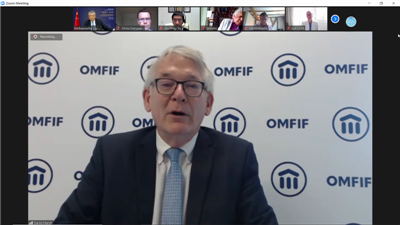
David Marsh from OMFIF: Thank you, Mr. Ambassador. It seems that you've missed an opportunity to bring Europe together on China's side, and to promote a kind of distance with the United States. Why haven't you taken that opportunity?
Ambassador Liu: I think there's a lot of misunderstanding of China's position. We do not try to drive a wedge between the United States and Europe. I know they are allies, and we just want to be friends with everybody. We want to have good relations with the United States. I've been posted twice in Washington DC. Half of my 45 years of diplomatic career was dedicated to China-US relations. We want to have good relations with the United States. We always believe that there will be no world peace or prosperity without a sound, stable relationship between China and the United States, but this relationship has to be based on mutual trust and equality. You need two to tango and you need two hands to clap. So we want to have a good relationship featuring no conflict, no confrontation, mutual respect and win-win cooperation based on coordination, cooperation and stability, and we are working for that.
On China-Europe relations, as I said in my presentation, which I don't need to repeat them, we want to see Europe and EU as partners of China, not rivals. We see each other as opportunities, and I am very pleased that we are the second largest trading partners of each other. And there is enormous common ground, common interests to tie our two sides together.
David Marsh: Could I just ask one simple question please, which relates to the UK but may also have some bearing on the European countries, which is the question of telecommunications. We've had the decision yesterday by the British government that we won't go ahead with Huawei in the UK, even though we know what that company has done on 5G network within a few years, and it will be bringing costs to the UK. What do you think will be the concrete results in terms of China-UK collaboration from that decision, which was announced yesterday?
Ambassador Liu: I think it first of all undermined the trust between the two countries. You know, mutual trust and mutual respect are really the basis for a relationship, not only between individuals but also between two countries. Yesterday I tweeted, "Disappointing and wrong decision by the UK on Huawei". I would even say it's not only disappointing, it's disheartening. You know, when you see this company, it's a good company. They've been here for 20 years. They not only invested 3 billion pounds in this country but also created 26,000 jobs, paid the tax and contributed greatly to the telecom industry of this country and to the local community. What they have done for this country is described by British media and some politicians as "hurt the country". It's very disheartening. The way you treat Huawei will be followed very closely by other Chinese businesses. When the mutual trust was undermined, it'll be difficult for the businesses to have more investment here.
So you don't need government to say anything. I think the businesses can come to their own conclusions. So I think the trust is seriously damaged between the countries and between the governments and the businesses.
David Marsh: Will the Golden Era between Britain and China be upheld or become somewhat more tarnished?
Ambassador Liu: The Golden Era really needs the two sides to make efforts. The Golden Era was proposed by the UK side. When President Xi Jinping was here in 2015, the UK leader proposed that we should build the Golden Era. We think this Golden Era is a reflection of the level of China-UK relationship. It is in the interest of the two countries. So we embraced this idea, we endorsed it and we agreed to this idea. So we work together to build this Golden Era. This is the fifth year of the Golden Era. I thought we could celebrate the fifth anniversary of the Golden Era. But, you know, so many things happened. It's not because of China.
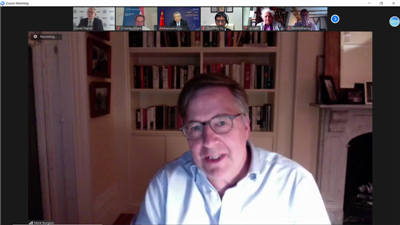
Mark Burgess from OMFIF: Thank you very much Ambassador. It's nice to see you again. I just want to ask you about multilateral versus bilateral relations and the balance that's going on in the world. We seem to have slipped into a bilateral world which I don't think helps with global trade, which we all benefit from. How do we get that balance between multilateral and bilateral back on track?
Ambassador Liu: China is very committed to multilateralism. This year, as I said, is the 75th anniversary of the founding of the United Nations. Not many people know that China was the first country who put its signature on the UN Charter. China has been committed to the international system with the UN at the core. China has fully implemented its international obligation. China never says China comes first, and China never withdraws from any international treaties. We've signed about five hundred international treaties, and joined one hundred international organizations. We also support WHO in playing a leading role in global response to Covid-19. And we have increased our donation to the WHO. We disagree with United States' withdrawal from the WHO. We also support WTO as the body taking care of international trade, though that system is not perfect. But so far you cannot find a replacement.
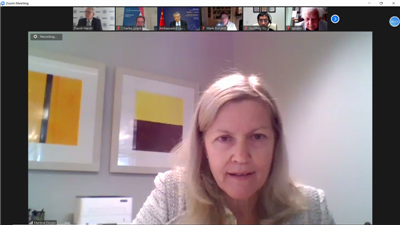
Martine Doyon from Goldman Sachs: Thank you very much and good morning Ambassador. The question I have for you is what are the prospects and the practical steps for cooperation between China and Europe on climate change, pandemic preparedness and developing country's debt forgiveness.
Ambassador Liu: China is very committed to the Paris Agreement on climate change. This year was supposed to be the year of environmental protection for China and the UK. As you know, China was due to host COP15 and UK is the host for COP26. But because of the pandemic, we both postponed these two conferences. China is working very closely with the UK online now. I just had a conversation with UK's COP26 Regional Ambassador Sir Laurie Bristow, and we want to work together to make it a new highlight, not only for China-UK relations. I think China and UK can provide leadership in climate change, and we both want to work together to make the two conferences great success.
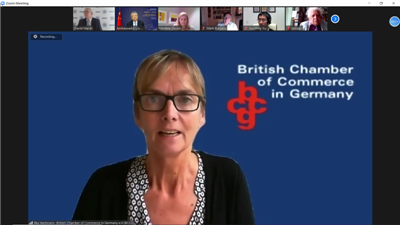
Ika Hartmann from British Chamber of Commerce in Germany: Because the EU has introduced new instruments to screen Chinese investments and enforced antitrust measures to create critical conditions for closer cooperation, it seems to me that now we've been talking in two different ways. How can you connect the two things? The EU wants to trade with China, EU wants to keep you as strong partner. And obviously China wants to do the same, but your level of taste is just investment from Europe in China, and what we request from China in Europe is different. We don't match each other's thoughts and accountability.
Ambassador Liu: I can say there are enormous opportunities of trade & investment collaboration with China. But the important thing is how the two sides see each other. Will they see each other as opportunities, as partner, or will they see each other as a systemic rival or a potentially hostile state? Now, look at Huawei, and the way UK treats Huawei. It is really not about a private company. The big picture is about China. How you look at Huawei really symbolizes how you look at and treat China. You know, during the debate, we should listen to people from across the spectrum. But the decision on Huawei was made in face of pressure from these 'China hawks' and 'China bashers'. You know, they all regard China as a hostile or potentially hostile country. They don't trust China, so they don't trust Chinese company. I don't know what will change when the trust was undermined. We do not want to see economic relationship to be politicized. But the other sides, who politicize the economic relations, join the United States to sanction Chinese company and to take China as a threat and a hostile country. How could you do normal business when the other side treats you as a potentially hostile country?
David Marsh: Are you saying China is generally blameless for the fact that we don't trust you? Or are you saying that there could have been things that China could have done better in order to produce more trust? You see the great difficulty for the other side for not trusting you, what could you do?
Ambassador Liu: We have to analyze the project case by case. Huawei has done everything they can. You know, you don't trust Huawei. You said Huawei had security problems. Then Huawei set up its own centre to analyze the security risk. And the center is managed by the British people, not people from Huawei. It was British technicians who assessed the risks. Then they came to the conclusion that they believe the risk was manageable and controllable. So that's why the UK government made the decision earlier this year though they gave Huawei 35% market cap, but they still think the risk is manageable. Huawei also tries to improve their technology to strengthen security. And when we say security risk, it is not necessarily from a country, maybe from a group or organization. So they want to make UK 5G network infrastructure more secure and more resilient. They've done their best. I do not see Huawei has anything we should complain about.
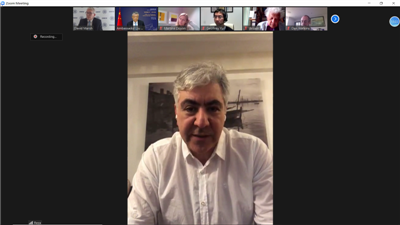
Reza Moghadam from Morgan Stanley: I have two very quick questions. First, Ambassador, you mentioned the support for the WTO both in Europe and China. But of course there is an impasse there at the moment. So my question to you is: Would China be prepared to join voluntarily a sub-set of countries that would abide by WTO decisions? Second, you mentioned at the outset that the very large volume of trade between China and the EU. Of course, a lot of that is in goods, but what is missing in that relationship is services. I wonder if Ambassador has any thoughts on how to increase the volume of services trade between the EU and China, which is much less significant than goods. Thank you very much.
Ambassador Liu: On the WTO, China is forthcoming in terms of engaging with the WTO, but still we have some disagreement with the European countries on how China should be treated. We still believe China is a developing country. Though China have fulfilled, three years ahead of schedule, the commitment made when it joined the WTO. China is still ready to make further progress on that.
On services trade, Europe, including UK, has its strength and advantages. I think that's why I said, there's complementarity between China and Europe in economy. We would like to have more European service businesses in China. If you have followed closely, China's New Foreign Investment Law came into effect at the beginning of this year. There are a lot of new policies regarding the service sector. China's service sector will be opened up wider, and many restrictions on the service sector have been lifted. More foreign banks and insurance companies can have more business opportunities in China. The cap has been brought down and the negative list has been shortened. We also lift the restrictions on Qualified Foreign Institutional Investor (QFII) and RMB Qualified Foreign Institutional Investor(RQFII).
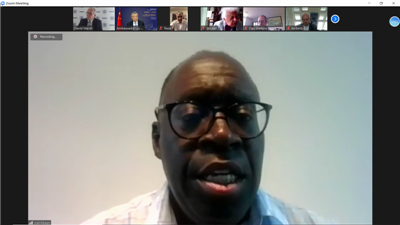
Joel Kibazo from African Development Bank: My question to you is that Africa is going to experience the deepest recession in 25 years. Will China, which holds a third or Africa's total external debt, be prepared to help as we go forward into what is really an unprecedented crisis?
Ambassador Liu: Yes. China sees Africa as a good brother and good partner. I've been posted twice in Africa. I have a very strong feeling for African countries. We attach great importance to our relations with the African countries. China pushed for and joined the exemption of debts for the poorest African countries within the framework of G20. During the latest World Health Assembly, President Xi Jinping announced, as one of the five measures, that China will do more to exempt the debt for African countries. In addition, China has sent many medical teams to help them fight COVID-19. We have provided them with PPEs and other most needed supplies. We have also shared experience with them. Even at the Chinese Embassy here, I worked with a British think tank to do that.
David Marsh: In terms of the writing off of debts, is it possible that China would join the Paris Club, in order to give a more formal way of rescheduling or writing off debts to the poorest countries? Is that something that China could do?
Ambassador Liu: China has joined many multilateral arrangements. I think we've done more on bilateral basis between African countries and China. We think that is more effective and more direct.
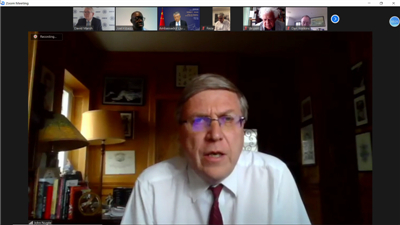
John Nugee from OMFIF: I want to understand more on the observed change of China's international policy, its approach to international relations. What stood out for me in the last 30 years is that China has adopted a firm national view on its differences with other nations and mutual respect and above all patience. Patience has been the watchword for China. And differences of views existed but they're not actively pursued. Now we observe a change. We observe a growing desire to close unanswered questions, whether it's Hong Kong or Taiwan. We also observe impatience with opposing views both internally and internationally. The wisdom of the earlier administrations - when there is a problem, shelf an argument - is not held. The enemy is not made. This has been given way to an urgent approach. The result is a less harmonious world for China and less respect for China, which pains anybody who's interested in the harmonious relations between Europe and China. I'm just puzzled as to why this happened. Why has China decided to abandon the wisdom of the last 25 years and adopt a more urgent approach to many issues facing the world?
Ambassador Liu: I would say China has not changed. You know, China is a peace loving country and peace is in the DNA of the Chinese nation. China works very hard for world peace and stability. China benefits from a peaceful environment for the past 40 years since we opened up and implemented reform. Why should we rock the boat and why should we change it? We believe that China will continue to benefit from this peaceful environment. But I think it is the other side that has changed tremendously. China has to make response to that. Take China-US relationship for example. We want to have a good relationship with the US. We have no reason to have bad relationship. But it is the United States, who imposes sanctions and demonizes China. Look at this pandemic. Their president, their secretary of state, keep calling "China virus". They withdrew from the WHO. Who has changed? I think people have to be objective with regard to change.
On Taiwan, we have a good cross strait-relationship with Taiwan when KMT was in office. But when the Democratic Progress Party came in, it pursued this road of "Taiwan independence". That causes a big problem for the cross-strait relationship. And the United States tried to play this Taiwan card with us. They increase their arms sales to Taiwan. They want to give international recognition to Taiwan. They rock the boat and we have to make response.
On Hong Kong, 23 years after the handover, "One Country, Two Systems" is a great success. Why should we rock the boat? But look at what happened last year? You know, there was turbulence. There's a movement for "Hong Kong independence", "self determination". They even waved the union jack and US flags, calling for the United States to land on Hong Kong to liberate Hong Kong. We have a reason to be worried about that. When we say "One Country, Two Systems", it is a complete concept.
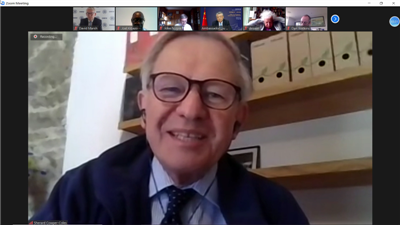
Sherard Cowper-Coles from HSBC: Very good to see you, Ambassador. I wanted to ask you about the disparity in understanding between Europe and China. In the UK at the moment, there're more than 150,000 Chinese students, China seems to know a lot about Europe. But yesterday's performance by conservative MPs showed that there is a great gap in understanding in the UK and across Europe more generally of China and China's history, and China's view of the world. Many people say they have no quarrel with the Chinese people; they just have a quarrel with the Chinese Communist Party, but forgetting that the Communist Party has 90 million members, etc. So I want to ask you, what more should we be doing to try and increase knowledge of China in Europe, particularly among those who make policy or form opinions, because there's a big deficit in understanding?
Ambassador Liu: Thank you for sharing your question. I assume next time when I prepare my speech, I would put in the fifth deficit that is understanding deficit. I quite agree with you that there's a big gap between China and Europe, mostly Western countries. So each time when some Western countries including Australia and the United States criticize China, they always say China is widely criticized. I would say they only represent a small number of western countries and they are not the world. Taking the National Security Law for example, more than 70 countries show support for this Law. And how many countries have stood against China? It's just one third of the number of countries that supported China. So I think the effective way is to engage actively with each other. I think we should not decouple with each other. That is a very bad idea. I think we need more coupling. We encourage China and Europe to have a cross-boarder engagement among the young people, the students. After what happened in the United States, more Chinese students intend to study here in this country. I hope the UK will continue to be open to Chinese students, and will continue to welcome Chinese students with open arms.
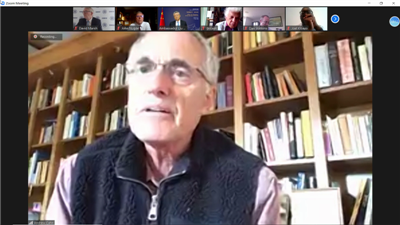
Kern Andrew from Nomura: Thank you very much, Ambassador, for your speech. I wanted to ask you about the question of interfering in internal affairs of other nations. I understand very well the Chinese perspective and view on this and respect it. However, is it a realistic view to take in a globalised world where what happens in one country affects another? Taking for example, environmental issues which you mentioned, and where China and Britain need to work together because of the upcoming conferences. What happens within China, which is a centre of biodiversity, is really very important and Britain has a real interest. China has a great interest in what happens in other countries. And when we interact, we have to speak to each other about what happens in each other's country.
Ambassador Liu: I think both Chinese and British people are smart, clever enough to discern what are interferences in others' internal affairs, and what are suggestions and advice with a good intention. When you have complaints about Chinese environment, we know that you want to improve China's environmental system, you want to make China's environment better. It is certainly welcomed. We certainly can see what are the advice with a good intention and what are interferences which want to change China's political and social system, and to impose upon China the western ideas and western model. As I said, we have no interest in exporting our models, but we are also strongly against foreign countries, no matter who they are, interfering in our internal affairs.
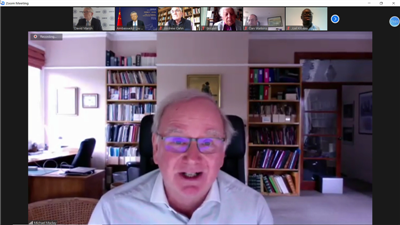
Michael Maclay from Montrose Associates: Ambassador, regarding the Huawei decision and the current bitterness and absence of trust you describe, maybe there are some specific things that China could do that would help to rebuild trust. First, for example, when the WHO team comes to China, will they be given access to the Wuhan laboratory? Secondly, might China explicitly acknowledge the principle of freedom of navigation in the South and East China Sea? And thirdly, would it still help to use the expression of "peaceful unification"?
Ambassador Liu: On the WHO, China has been very transparent and responsible. From the very beginning, China is the first country to report the case and the first country to share the genetic sequence. We have nothing to hide and I think it is other countries that try to stigmatize China. WTO experts are in China now and China is working with them. I believe the two sides will have a productive and effective cooperation. We support the WHO in playing a leading role but we have to remember two things. Firstly, the research on the origin of the virus should be based on science, not on politics. Secondly, all country should be subject to review, not only China. I think the WHO also has a responsibility to find out why things run so badly in some countries, as the cases keep going up, breaking records within the past few days.
On the freedom of navigation, China is a country which is fully committed to the freedom of navigation. 60% of China's oil supply comes through the South China Sea. We have every reason to ensure peace, stability in this region and we work very hard with the neighbouring countries, working on the DOC and COC. And the situation is very peaceful, if it was not for some foreign naval vessels that came here from time to time to threaten China, to infringe upon China's sovereignty.
On Taiwan, China is still committed to peaceful reunification. There is no change to this principled position. I suggest you read my article on this question carried by China Daily newspaper recently. I wish to reaffirm that Taiwan is an inalienable part of Chinese territory. China has consistently adhered to the policy of peaceful reunification. By making no commitment to giving up the use of force, the Chinese Government is targeting external interference, and the secessionist elements who advocate "Taiwan independence" and their separatist activities. This is not aimed at the compatriots in Taiwan. China must be reunified and will be reunified. This will not be stopped by anyone or any force.
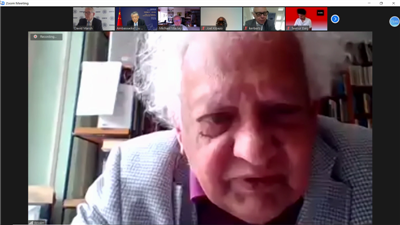
Meghnad Desai from OMFIF: China's economy has recovered quickly following the pandemic. Does China have any plan to strengthen the status of RMB as a possible reserve currency in the near future?
Ambassador Liu: China is very committed to internationalization of the RMB. In the past decade, we have made a lot of efforts in order to facilitate trade and investment. More and more countries take RMB as not only a currency for doing trade or investment, but also use it as a reserve currency. So I'm very pleased to see that London is now playing a leading role in RMB internationalization. London now is the second largest offshore RMB clearing center, and the largest offshore RMB trading center. Hong Kong is the largest offshore RMB clearing center, and the second largest offshore RMB trading center. I think the two cities have enormous opportunities for cooperation.
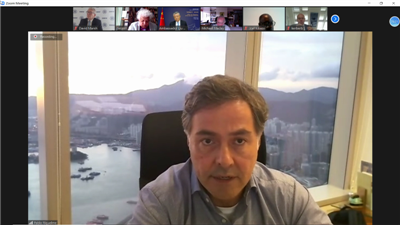
Pablo Riquelme Turrent from BBVA: Thank you, Ambassador. I would like to hear your opinion about the future relationship with Latin America, and especially with Mexico, being so close to the United States and having this partnership with the United States and Canada. I wonder if it's going to change going forward? Is it a friendly relationship? How do you see it develop?
Ambassador Liu: I think the relationship between China and Mexico is very strong. There's a mechanism between China and Latin American countries, a summit held from time to time. And we would like to strengthen our relationship with Latin American countries. We are not concerned about Mexico's good relations with the United States. But we hope that the United States will not interrupt China's good relations with the Latin American countries.
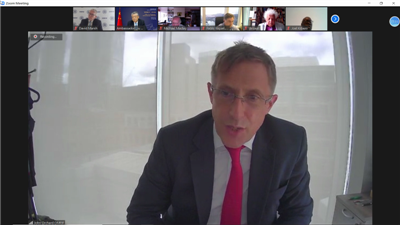
John Orchard from OMFIF: Thank you very much, Ambassador, for talking to us today. You talked at the beginning about China-Europe relations. As the UK has left the European Union, does it remain part of your Europe strategy, or is it practically part of your American strategy or something else?
Ambassador Liu: It's up to the UK. I always argue with my British colleagues: we are not asking you to take side between China and the United States; I'm just asking you to take the right side of the argument. That's my first point.
The second point is, I would argue that Britain can only be Great Britain when the UK has an independent foreign policy, rather than to be viewed in China or the rest of the world that the UK is just a junior partner of the United States. Look at what happened to Huawei. I do not need to elaborate the obvious. Even yesterday, President Trump said he personally pinpointed Huawei and he made great success. And look at what their Ambassador is twitting and look at what their Secretary of State is saying after the decision was made by the UK Government. So everybody understands what the reason is behind the UK decision. When the UK wants to build global Britain, to still exert a global influence, they really have to think deep on what kind of a role they are going to play, and what kind of a position they're going to take. We want to have good relations with the EU and with the UK. There's no doubt about that.
David Marsh: Ambassador, I'd like to thank you for being so frank and open with us. I do hope this won't be the last time that we have this very good conversation.
Ambassador Liu: Thank you.
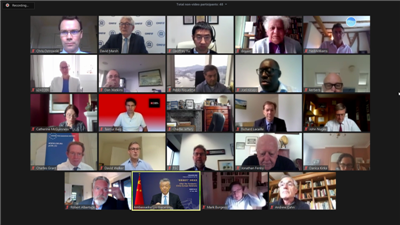
|

